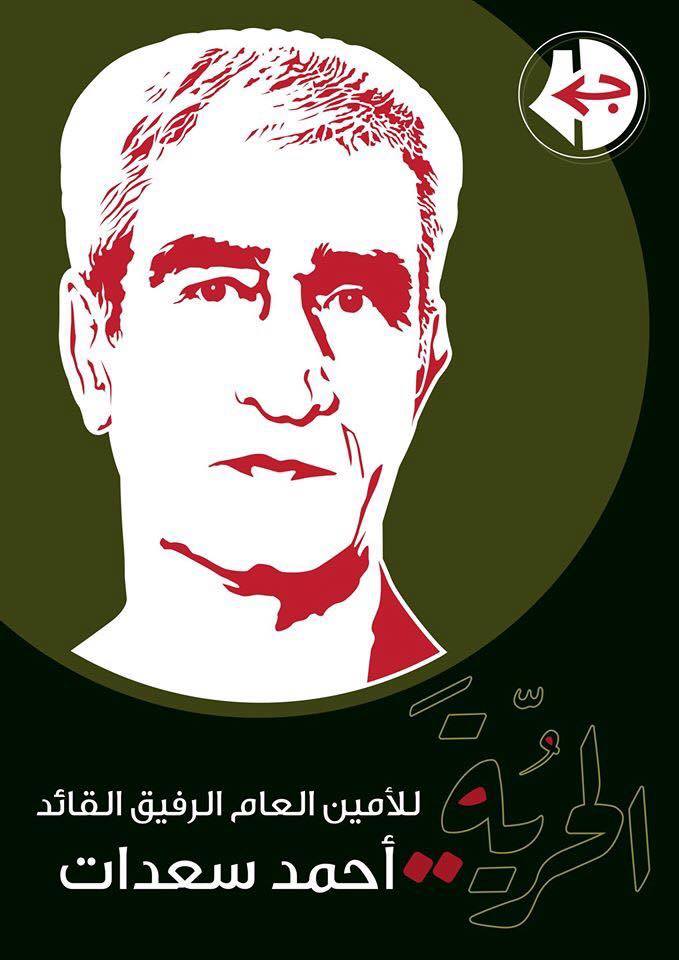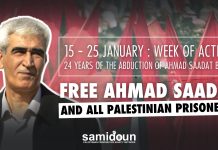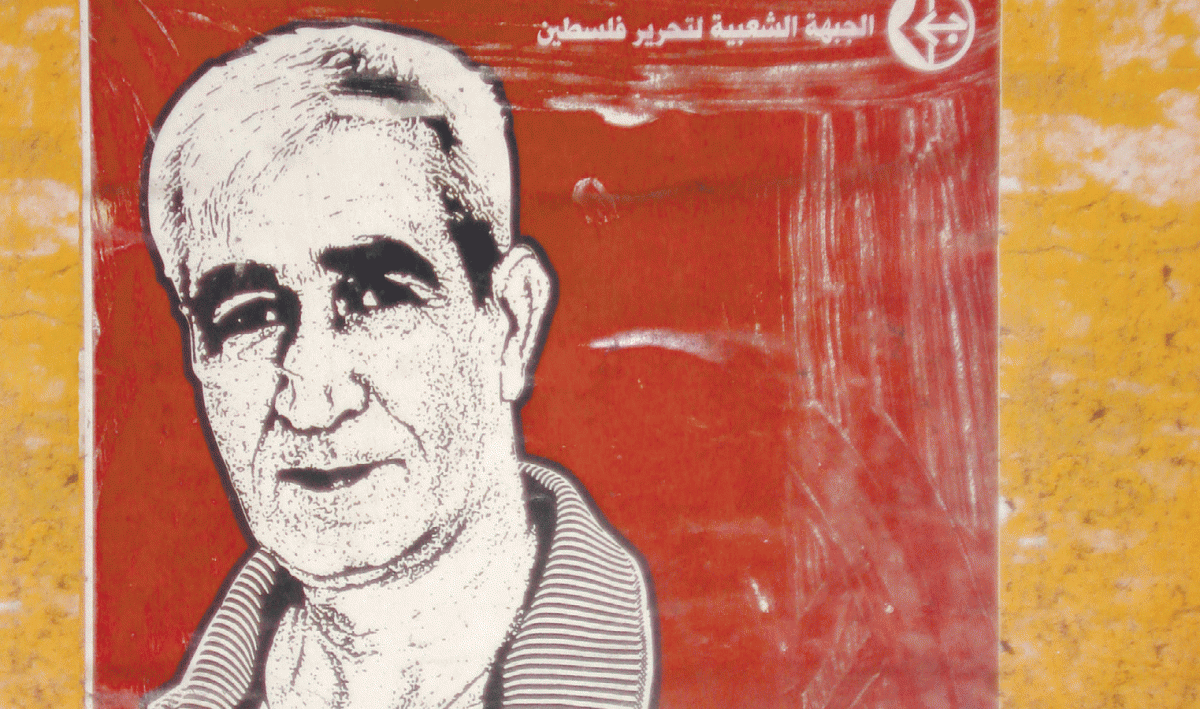Marking Palestinian Prisoners’ Day, and as over 1,500 Palestinian political prisoners enter an open hunger strike for a series of demands, HadfNews published an interview with imprisoned Palestinian leader Ahmad Sa’adat, his answers received from Ramon prison, where Sa’adat, the General Secretary of the Popular Front for the Liberation of Palestine, is confined by the Zionist occupation.
Sa’adat has been imprisoned since 2006 in Zionist jails and since 2002 in Palestinian Authority prisons under U.S. and British guard; he was abducted from the PA’s Jericho prison along with his comrades in March 2006. The translation of the interview follows below:
On Palestinian Prisoners Day, we hope to grasp the image and reality of the prisoners’ movement and the horizon of struggle within the Zionist prisons. Also, what is the possibility of the unity of the movement to confront the repressive practices of the prison administration?
The issue of prisoners is one of the most important dimensions of the Palestinian national project, like the defense of the land, resistance to the settlements, the Arab identity of Jerusalem and the return of refugees.
Accordingly, the prisoners’ movement is one of the pillars of the Palestinian national movement in general. It is advanced on the front lines of the conflict with the occupation, and affects the advance of the national struggle in the conflict with the enemy at all levels. Behind the prison walls, a constant state of conflict with occupation forces arose following the open hunger strike waged by the Popular Front against solitary confinement in September 2011, opening the door to many individual initiatives of struggle against administrative detention, and later the broad general strike waged by the prisoners’ movement in April-May 2012. This achieved a victory in releasing prisoners from solitary confinement, ensuring the right to family visits for prisoners from the Gaza Strip, as well as many other achievements on living conditions.
This victory created favorable conditions to achieve the unity of the prisoners’ movement and its mechanisms of struggle, but the organizational choices of the brothers in the Fateh movement did not help in accomplishing this. The prisoners’ movement was impacted by the repercussions of the division, and the prison administration played a divisive role between prisoners of various factions.
We hope that the strike that the prisoners’ movement plans to wage in April will include all factions of the national movement and will lead to unifying the Fateh movement’s structures as well as transitioning to a new phase for the unity of the entire prisoners’ movement at the levels of program and action.
How do you see the role of the prisoners’ movement? Along with steadfastness and struggle inside Zionist prisons, can it play a pivotal role in the Palestinian overall national reality? What is the outcome of the crisis, and what are the ways out of this reality?
The Palestinian prisoners’ movement plays a diverse and historic central role in nurturing and promoting the Palestinian national liberation struggle since its inception. In the last six years it has formed a focus for the struggle of our people through its activities to build the national cause, and at the regional and international level. The prisoners’ movement also took the initiative to create the national reconciliation document, which was unanimously agreed upon by all the national and Islamic factions to end the division. But the process of national advancement and reconciliation cannot only be on the shoulders of the prisoners’ movement. Its role is integrated with the struggles of our people in every clash with the enemy and in the forefront, breaking with the circle of illusions around the absurd negotiations and fully cutting off the approach of Oslo, and rebuilding the Palestinian national program of struggle. This program must be built upon the road of resistance and upon rebuilding the Palestinian internal house with democratic mechanisms for national leadership. Together, we can leave the state of national crisis through advancing the struggle.
What are the main national strategic points in relation to the issue of prisoners at Palestinian, regional and international levels?
At the Palestinian national level, the Palestinian prisoners’ movement represents a living witness to the continuation of our people’s resistance to the Zionist settler colonial project. What is needed from the Palestinian national liberation movement is to deal with this issue first and foremost as a serious commitment alongside other national issues of struggle, as part of a Palestinian program of resistance that reflects the identity and importance of the prisoners’ struggle. It is important to avoid sectarian instrumentalization, individualism, or shuffling the cards [to create a distraction], in order to chase a political settlement. It is critical to escape from the political blackmail of the parties of the division and get on the road to national unity in struggle and mobilizing the resistance of the people. This needs hard work put to the task of liberating the prisoners and supporting their struggle at the forefront of the program of national struggle. Within the prisoners’ movement, this means working on a daily level to invest in confrontation and rebuild the prisoners’ movement with a unified body and program.
At the regional and international levels, regionalization and internationalization of the cause and the prisoners’ status as freedom fighters is important, as is providing legal and political protection for their struggle, and building the pressure at the international level to compel the occupation to respect international humanitarian law, particularly the Geneva Conventions, and implement international resolutions for the Palestinian people’s right to return, self-determination and national independence.
In light of the Palestinian Authority’s role and reliance on the American-Zionist vision on multiple levels, including the internal political situation and continued reliance on settlement, negotiations, security coordination and the arrest and prosecution of resistance fighters while cracking down on people and violating social rights – what is your vision on how to deal with it?
The continued dependence of the Authority on the American-Zionist program, and its pursuit of useless “opportunities” for futile negotiations, while continuing security coordination and the pursuit of resistance strugglers, is a poisoned dagger in the back of the resistance, transferring the contradiction with the occupation to the internal Palestinian scene and deepening the division.
It is impossible and neither realistic nor possible to combine the “sanctity” of security coordination with adherence to a path of resistance. The continuation of this policy is not only a political framework but a choice for a class, reflecting the interests of the sectors and class of beneficiaries at the top of the hierarchy of the Authority and the PLO. The struggle against this approach requires:
First, to escalate the resistance of our people on all levels and using all methods to make the resistance a daily reality that governs our relations with the occupation. On the other hand, escalating the national struggle against the practices of the Authority, including security coordination and the violation of the political, social and democratic rights of Palestinians, first and foremost, the right to resist occupation.
In this context, the development of a national democratic pole can be built on the basis of a leftist program and a national democratic vision to confront the project of the Authority is an urgently necessary step that cannot be postponed.
The Zionist project is maintaining its objectives. Meanwhile, Iraq and Syria are subject to war and destruction while many Arab rulers are racing toward alliance with “Israel” under the pretext of the nuclear confrontation with Iran. Does the Zionist entity still function as an occupation entity associated with colonialism and imperialism or is it something else? What is necessary in terms of response?
The nature of the Zionist racist settler colonial project as a mechanism of imperialism in the region has not changed. The change is the absence of the national custodian and incubator of resistance to this project and its national program, based on confronting its nature and its objective contradiction with any resolution to the struggle in Palestine. This type of imperialist project cannot be reconciled with and its racist essence cannot be defeated without thoroughly dismantling it. The examples of this are many, in addition to its growing strength when compared to the weakness of the Palestinian resistance and the progressive Arab project, which has only added to its imperialist role as the partner of the imperial project in the region and the world, with the right to determine imperial programs and priorities in the region and increase its share of the profits.
What is required in order to mobilize resistance and achieve victory is to rebuild a strategic national program on the basis of a clear and objective understanding of this project and the nature of imperialism, and the complete rejection of all illusions that have been manifested on the basis of the Madrid-Oslo approach and its subsequent developments.
The maximum that can be accepted by the Zionist entity is to create an administrative “autonomy” under its control to serve as a bridge to extend the power of imperialism in the Arab world, a facade of a state. This is why we must reunify our national liberation project for the unity of our people, land, identity and destiny, restore the Arab dimension of the Palestinian cause and strengthen relations with the Arab national forces confronting this project. It is critical to cut the relationship with the enemy and expand political confrontation with the entity in all international spaces, building the boycott and isolation of the occupier and exposing its racist illegitimacy.
In short and urgently, we must return to the program of national liberation before the lessons of Oslo and the vocabulary of settlement, and struggle to achieve one liberated democratic Palestinian state on the entire land of Palestine. We must end the division and rebuild the PLO in a democratic way as a universal reference of the highest leadership of our people, involving all social and political colors, and examining all the options for our people in the framework of democratic institutions.
The Arab situation today is still witnessing a large amount of chaos, conflict, terror and war, and the specter of sectarian and confessional division has become a reality. How do you see the future reality of the Palestinian cause in light of the situation? What is required at the Arab level?
Indeed, the current Arab situation is indescribable, after the invasion of Iraq, the division of the land and people in Libya, and the attempts being made to dismantle the land and people of Yemen and Syria and the completion of the “Greater Middle East” project.
It is natural that this situation is alien to the Palestinian national liberation movement and the Palestinian national project in general, and it is also self-evident that the absence of advanced Arab national movements and their extensions in the region is the main cause of this dire situation.
On the Palestinian level, our people have many strengths that enable them to confront these projects aimed at the liquidation of our national cause. It is urgent to construct and promote national unity and an end to division, which can mobilize our national struggle to disrupt the imperialist programs in the region and pressure the official Arab reactionary regimes to halt their destructive projects in Syria, Yemen and Libya, and can provide a climate to end this situation of war and achieve democracy and political solutions to these crises, so as to ensure the unity of that country’s land and people.
The mobilization of the Palestinian role is capable of providing a real climate for resistance to these projects. The most prominent, central task which can play a decisive role in this direction is to rebuild the national-democratic movement and its extensions in each country to fill the vacuum that has opened the door to all forms of international intervention in Arab internal affairs. The Progressive Arab Front, launched last year, can be an important step in that direction.
The pace of extremism, populism and racism in the European and Western countries has risen in general, including in the United States, where President Donald Trump came to the presidency on such a campaign. Trump has arrived carrying in his quiver new conditions and dictates for Palestinians and Arabs. How do you see the role of the United States of America on the international level? Will we see the emergence of a strong alternate pole confronting its monopoly in international institutions? What are the implications for the Palestinian cause?
The high pace of populist extremism in the capitalist world is a logical consequence of the crisis of this system which worsened in 2008 and whose repercussions are still felt today. At the same time, this exacerbates the contradictions between the capitalist countries, particularly with the United States.
We have already seen that the financial crisis of 1929 led to Nazism and fascism and the 1970s economic crisis gave birth to Reagan and Thatcher.
These contradictions are likely to worsen and bring an era to a close. It is natural to see the emergence of various economic and political alliances and national groupings, including the emergence of the role of the European Union, the BRICS countries. Today, the role of Russia and China is felt strongly on the world stage and highlights a hub that would help to establish an international balance on the global level and weaken the dominance of the United States at a world systems level.
The victory of Trump is an important indicator of the growing advancement of extremist and populist trends internationally, but it also opens up a wide, favorable climate for the advancement of a radical anti-imperialist left, especially in light of the inability of these prevailing trends to solve the problems of the people created by capitalism.
At the level of the Palestinian situation after the election of Trump as the president of the United States, known as he is for his support of the Zionist entity, the situation will be worse and continue on the path of all previous US administrations that have always been biased to the positions of the Zionist entity and have never taken any serious step to stop the violations of the Zionist state or its excesses. The difference between the positions of previous administrations and that of the Trump administrative is not qualitative but quantitative. The prevailing political situation impacts the direction of the Zionist – Palestinian – Arab struggle. What is needed to respond firmly to the policies of the Trump administration and not passively adopt his dictates and requirements.
The Popular Front for the Liberation of Palestine is moving toward the fiftieth anniversary of its founding. How do you evaluate the situation of the Front overall and how do you view its role and functions in the next phase?
The most recent Seventh National Congress of the Front resulted in decisions that serve as a qualitative leap for the role of the Popular Front and the national democratic line in all areas of work and struggle, including strengthening and developing its political and national positions. This also means strengthening militant organizations, mass movements and popular struggle to address national and social issues and to confront and solve the everyday problems affecting our people. This is especially true in the Gaza Strip, which is still reeling from the disaster of war. However, this progress has not yet lived up to the level of the role that should be played by the front, or the size of the national tasks that must be faced by our people and our cause.
It is necessary to increase and elevate our level of work and effort in all arenas of activity, especially through the leadership bodies and cadres of the Front in general, as well as what is needed to advance the national role of the Front. Therefore, we need concrete steps to unify democratic forces and develop a leftist democratic pole and strengthen its role in Palestinian society.
In addition, building the Arab Progressive Front and expanding its ranks to activate its role on the overall level to bring about integration between the Arab and Palestinian dimensions of the struggle and to mobilize the Arab masses to counter the dissipation of the Arab national movement and rise out of the current impasse of the Arab nation. I hope that the Front’s next national Congress will further develop to awaken and indeed double this role, in proportion to the size of the responsibility placed upon it as an organization and as a national leftist democratic framework.








